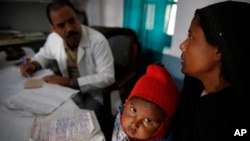U.S. researchers have come up with a strategy they hope will motivate pharmaceutical companies, who spend billions yearly to develop medications for a host of illnesses, to direct their drugs where they will have the greatest impact.
It is called the Global Health Impact Index, and it is a simple way to track the places in the world where vital drugs can have the biggest impact. It was created by researchers at Binghamton University in New York and will soon be launched by the World Health Organization.
The Web index, described in the journal PLOS One, is designed to identify companies that are doing the most to improve global health and those that are doing the least.
Binghamton philosophy professor Nicole Hassoun, who helped create the Web tool, said that in the evaluation of each drug, "we look at three things: the need for the drug, how effective it is and how many people who need the drug can access it.”
Hassoun said about one-third of deaths globally are linked to poverty-related diseases such as malaria, tuberculosis and AIDS, "so if we can incentivize greater access [for] essential medicines, that could make a really big difference for people who are suffering around the world.”
The index identifies three companies — Sanofi, Novartis and Pfizer — whose drugs are having the biggest impact on the three diseases.
The website also tracks donations and companies that provide drugs at reduced cost to the world’s poorest individuals. Hassoun said that helps visitors see which companies are making drugs available to the world’s most impoverished people.
“You see the total impact they are having on these different diseases with these medicines," she said. "It is simple and easy to understand, and you can see in a transparent way where we are having an impact and where we need to have a greater impact on global health.”
By identifying the companies that are most responsive to the needs of poor individuals, Hassoun hopes drug manufacturers that are not doing as well in providing affordable medications will be motivated to follow suit.




